-
 Bitcoin
Bitcoin $82,770.9885
-0.53% -
 Ethereum
Ethereum $1,811.0838
-0.62% -
 Tether USDt
Tether USDt $0.9996
-0.01% -
 XRP
XRP $2.0610
1.56% -
 BNB
BNB $591.5998
-0.12% -
 USDC
USDC $0.9999
0.00% -
 Solana
Solana $116.7637
-3.59% -
 Dogecoin
Dogecoin $0.1606
-2.58% -
 Cardano
Cardano $0.6491
0.00% -
 TRON
TRON $0.2375
1.32% -
 Toncoin
Toncoin $3.6204
-7.56% -
 UNUS SED LEO
UNUS SED LEO $9.4063
0.23% -
 Chainlink
Chainlink $12.8000
-2.19% -
 Stellar
Stellar $0.2605
1.01% -
 Avalanche
Avalanche $18.1124
-1.26% -
 Sui
Sui $2.2384
-2.51% -
 Shiba Inu
Shiba Inu $0.0...01223
0.65% -
 Hedera
Hedera $0.1627
0.30% -
 Polkadot
Polkadot $4.0538
1.44% -
 Litecoin
Litecoin $82.9722
0.02% -
 MANTRA
MANTRA $6.4051
3.36% -
 Bitcoin Cash
Bitcoin Cash $301.6530
1.88% -
 Bitget Token
Bitget Token $4.4826
-1.05% -
 Dai
Dai $1.0000
0.02% -
 Ethena USDe
Ethena USDe $0.9995
-0.02% -
 Monero
Monero $212.5474
-1.93% -
 Hyperliquid
Hyperliquid $11.6624
-5.49% -
 Pi
Pi $0.5680
-13.45% -
 Uniswap
Uniswap $5.8333
-1.59% -
 Aptos
Aptos $5.0533
-1.32%
How does blockchain achieve decentralized data storage?
Blockchain's decentralized storage enhances security and resilience by distributing data across nodes, ensuring integrity through cryptographic hashing and consensus mechanisms.
Mar 27, 2025 at 08:07 am
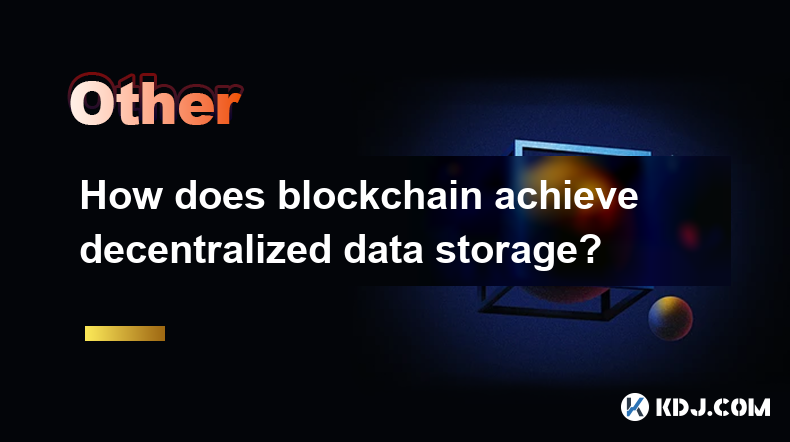
Understanding Decentralized Data Storage in Blockchain
Blockchain technology achieves decentralized data storage through a distributed network of computers, each holding a copy of the entire blockchain. This differs significantly from centralized systems where data resides on a single server. The distributed nature inherently enhances security and resilience, making it difficult for a single point of failure to compromise the entire system. Data is not stored in a single location, eliminating vulnerabilities associated with centralized databases.
The Role of Nodes in Decentralized Storage
The core of blockchain's decentralized storage lies in its network of nodes. Nodes are computers that participate in the blockchain network, each running a full copy of the blockchain ledger. These nodes independently verify and validate transactions, ensuring data integrity and consistency across the entire network. Any attempt to alter data on one node will be immediately detected and rejected by the other nodes, maintaining the integrity of the blockchain.
Data Structure and Immutability
Blockchain employs a specific data structure, typically a chain of blocks, to store information. Each block contains a cryptographic hash of the previous block, creating an immutable chain. This linking ensures that any modification to a past block would be immediately apparent due to the change in the cryptographic hash. This immutability is crucial for maintaining the integrity and trustworthiness of the stored data. The cryptographic hashing ensures that any tampering is immediately detectable.
Consensus Mechanisms and Data Validation
To maintain consistency across the distributed network, blockchain utilizes consensus mechanisms. These mechanisms ensure that all nodes agree on the valid state of the blockchain. Popular consensus mechanisms include Proof-of-Work (PoW) and Proof-of-Stake (PoS). These algorithms govern how new blocks are added to the chain, verifying the legitimacy of transactions and ensuring data integrity. Consensus mechanisms are vital for maintaining the integrity and consistency of the blockchain.
Replication and Data Redundancy
The decentralized nature of blockchain ensures data redundancy. Every node maintains a complete copy of the blockchain. This replication significantly improves the system's resilience against data loss. If one node fails, the data remains accessible through other nodes. This inherent redundancy is a key differentiator from centralized systems, where a single point of failure can lead to complete data loss. Redundancy safeguards against data loss and improves the system's reliability.
Data Storage and Block Structure
Each block in a blockchain typically contains a timestamp, a set of validated transactions, and a cryptographic hash of the previous block. The transactions themselves contain the relevant data being stored on the blockchain. This structure allows for efficient verification and validation of data, ensuring that all transactions are properly recorded and linked within the chain. The block structure ensures data integrity and traceability.
Security Implications of Decentralized Storage
Decentralization significantly enhances security. Because the data is not stored in a single location, it is far more resistant to attacks such as hacking or data breaches. Compromising the entire blockchain would require simultaneously compromising a significant portion of the distributed network, a task that is practically infeasible. Decentralization makes the system significantly more resistant to attacks.
How New Data is Added to the Blockchain
Adding new data to a blockchain involves several steps:
- Transaction Creation: A transaction is initiated, containing the data to be added.
- Transaction Broadcasting: The transaction is broadcast to the network of nodes.
- Verification and Validation: Nodes verify the transaction's validity according to the blockchain's rules and consensus mechanism.
- Block Creation: Once verified, the transaction is included in a new block.
- Block Addition: The new block is added to the blockchain, linking it to the previous block via its cryptographic hash.
Scalability Challenges in Decentralized Storage
While decentralized storage offers significant advantages, it also faces scalability challenges. The need for each node to maintain a complete copy of the blockchain can become computationally expensive and resource-intensive as the blockchain grows larger. This is an active area of research and development within the cryptocurrency space.
Data Retrieval from a Decentralized Blockchain
Retrieving data from a decentralized blockchain involves querying the network of nodes. Nodes respond with the relevant data from their copy of the blockchain. The immutability of the blockchain ensures that the retrieved data is accurate and hasn't been tampered with.
The Importance of Cryptography in Blockchain Data Storage
Cryptography plays a vital role in securing blockchain data. Cryptographic hashing ensures data integrity, while digital signatures authenticate transactions and prevent unauthorized modifications. This robust cryptographic framework is fundamental to the security and trustworthiness of the entire system.
Comparing Decentralized and Centralized Data Storage
Centralized systems store data on a single server, offering ease of access but posing significant security risks. Decentralized systems, like blockchain, distribute data across a network, enhancing security and resilience but potentially sacrificing ease of access and scalability. Each approach has its strengths and weaknesses depending on the specific application.
Common Questions and Answers
Q: What are the advantages of decentralized data storage using blockchain?
A: Decentralized storage offers enhanced security, resilience against single points of failure, and data immutability. It's resistant to censorship and single points of failure.
Q: What are the disadvantages of decentralized data storage using blockchain?
A: Scalability limitations, slower transaction speeds compared to centralized systems, and increased complexity are potential drawbacks.
Q: How is data privacy handled in a decentralized blockchain?
A: Data privacy depends on the specific implementation of the blockchain. Some blockchains offer mechanisms for privacy-enhancing technologies, while others store data publicly. Pseudonymity is often used, but true anonymity is rare.
Q: What are some real-world applications of decentralized data storage using blockchain?
A: Supply chain management, digital identity verification, secure voting systems, and decentralized file storage are examples of real-world applications.
Q: What are the different consensus mechanisms used in blockchain, and how do they affect data storage?
A: Proof-of-Work (PoW) and Proof-of-Stake (PoS) are common mechanisms. They influence the speed and efficiency of data addition and validation, impacting the overall performance of the decentralized storage system.
Disclaimer:info@kdj.com
The information provided is not trading advice. kdj.com does not assume any responsibility for any investments made based on the information provided in this article. Cryptocurrencies are highly volatile and it is highly recommended that you invest with caution after thorough research!
If you believe that the content used on this website infringes your copyright, please contact us immediately (info@kdj.com) and we will delete it promptly.
- Gold Exempt From New "Reciprocal" Tariffs
- 2025-04-04 06:35:12
- Time to Buy Aptos (APT) Cheap? This Chart Pattern Signals a 10% Move for the Price!
- 2025-04-04 06:35:12
- An Analyst Has Explained How Dogecoin Could Be at a Make-or-Break Level Right Now Based on a TA Chart Pattern
- 2025-04-04 06:30:12
- Micro Intelligence Company Strategy Has Purchased 22,048 Bitcoins Worth $1.92 Billion in a New Deal
- 2025-04-04 06:30:12
- BlockDAG's Beta Testnet Is Live— Aims to Achieve 15K TPS! Ethereum Price Falls 0.5% & ETC Dips 6.7%
- 2025-04-04 06:25:12
- title: New decentralized finance (DeFi) trading altcoin is surging after gaining support from the top US-based crypto exchange platform by volume
- 2025-04-04 06:25:12
Related knowledge

What are the future development trends of blockchain game development?
Apr 03,2025 at 05:00am
Blockchain technology has revolutionized various industries, and gaming is no exception. As we look to the future, several trends are set to shape the development of blockchain games. These trends not only promise to enhance the gaming experience but also to integrate blockchain technology more seamlessly into the gaming ecosystem. Let's explore these t...

What are the maintenance costs of blockchain system development?
Apr 03,2025 at 06:07pm
The maintenance costs of blockchain system development are multifaceted and depend on various factors. These costs can include technical maintenance, security updates, infrastructure expenses, and personnel costs. Understanding these elements is crucial for anyone planning to develop or maintain a blockchain system. Technical MaintenanceTechnical mainte...
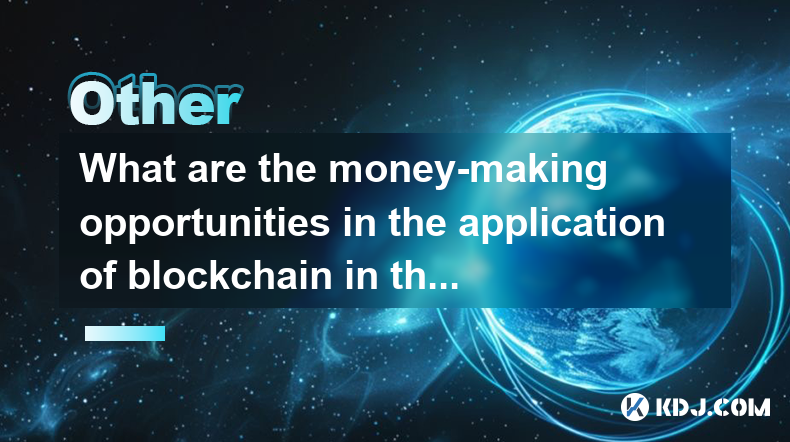
What are the money-making opportunities in the application of blockchain in the medical industry?
Apr 03,2025 at 03:35am
The integration of blockchain technology into the medical industry presents a myriad of money-making opportunities that can revolutionize healthcare systems. Blockchain's inherent characteristics, such as transparency, security, and immutability, make it an ideal solution for various medical applications. By leveraging blockchain, companies can develop ...
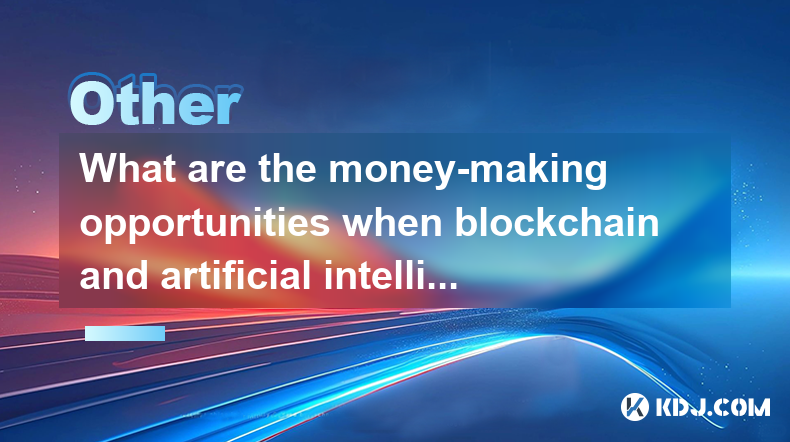
What are the money-making opportunities when blockchain and artificial intelligence are combined?
Apr 04,2025 at 01:28am
The convergence of blockchain and artificial intelligence (AI) presents a myriad of money-making opportunities within the cryptocurrency circle. This fusion leverages the decentralized and secure nature of blockchain with the analytical prowess of AI, creating innovative solutions and platforms that can generate significant revenue. From enhancing tradi...
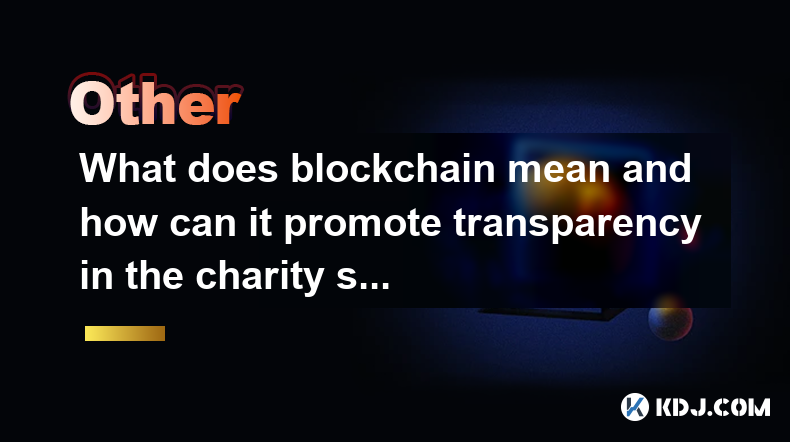
What does blockchain mean and how can it promote transparency in the charity sector?
Apr 03,2025 at 08:29pm
Blockchain technology is a decentralized, distributed ledger that records transactions across numerous computers. This ensures that the data is transparent and nearly impossible to alter retroactively. Essentially, blockchain serves as a digital ledger of all cryptocurrency transactions, enabling secure and direct exchanges without the need for intermed...
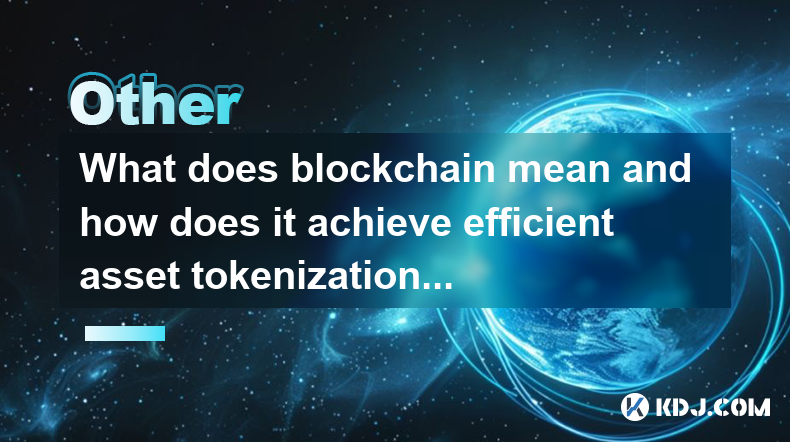
What does blockchain mean and how does it achieve efficient asset tokenization?
Apr 03,2025 at 07:57pm
Blockchain technology is a decentralized, distributed ledger that records transactions across numerous computers. It ensures that each transaction is secure, transparent, and immutable. The concept of blockchain was introduced with the launch of Bitcoin in 2009, but its applications have since expanded far beyond cryptocurrencies. At its core, blockchai...

What are the future development trends of blockchain game development?
Apr 03,2025 at 05:00am
Blockchain technology has revolutionized various industries, and gaming is no exception. As we look to the future, several trends are set to shape the development of blockchain games. These trends not only promise to enhance the gaming experience but also to integrate blockchain technology more seamlessly into the gaming ecosystem. Let's explore these t...

What are the maintenance costs of blockchain system development?
Apr 03,2025 at 06:07pm
The maintenance costs of blockchain system development are multifaceted and depend on various factors. These costs can include technical maintenance, security updates, infrastructure expenses, and personnel costs. Understanding these elements is crucial for anyone planning to develop or maintain a blockchain system. Technical MaintenanceTechnical mainte...

What are the money-making opportunities in the application of blockchain in the medical industry?
Apr 03,2025 at 03:35am
The integration of blockchain technology into the medical industry presents a myriad of money-making opportunities that can revolutionize healthcare systems. Blockchain's inherent characteristics, such as transparency, security, and immutability, make it an ideal solution for various medical applications. By leveraging blockchain, companies can develop ...

What are the money-making opportunities when blockchain and artificial intelligence are combined?
Apr 04,2025 at 01:28am
The convergence of blockchain and artificial intelligence (AI) presents a myriad of money-making opportunities within the cryptocurrency circle. This fusion leverages the decentralized and secure nature of blockchain with the analytical prowess of AI, creating innovative solutions and platforms that can generate significant revenue. From enhancing tradi...

What does blockchain mean and how can it promote transparency in the charity sector?
Apr 03,2025 at 08:29pm
Blockchain technology is a decentralized, distributed ledger that records transactions across numerous computers. This ensures that the data is transparent and nearly impossible to alter retroactively. Essentially, blockchain serves as a digital ledger of all cryptocurrency transactions, enabling secure and direct exchanges without the need for intermed...

What does blockchain mean and how does it achieve efficient asset tokenization?
Apr 03,2025 at 07:57pm
Blockchain technology is a decentralized, distributed ledger that records transactions across numerous computers. It ensures that each transaction is secure, transparent, and immutable. The concept of blockchain was introduced with the launch of Bitcoin in 2009, but its applications have since expanded far beyond cryptocurrencies. At its core, blockchai...
See all articles






















































































